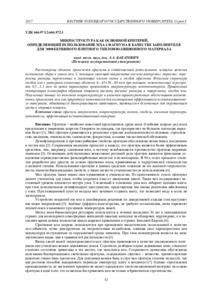Please use this identifier to cite or link to this item:
https://elib.psu.by/handle/123456789/20890| Title: | Микроструктура как основной критерий, определяющий использование мха сфагнума в качестве заполнителя для эффективного плитного теплоизоляционного материала |
| Authors: | Бакатович, А. А. |
| Issue Date: | 2017 |
| Publisher: | Полоцкий государственный университет |
| Citation: | Вестник Полоцкого государственного университета. Серия F, Строительство. Прикладные науки. - 2017. - № 8. - С. 42-46. |
| Abstract: | Рассмотрены области применения сфагнума в хозяйственной деятельности человека, включая технологию сбора и сушки мха. С помощью световой микроскопии изучено внутреннее строение, определены размеры паренхимных и гиалиновых клеток листа и стебля сфагнума. Ячеистая структура стебля мха с размерами клеточных оболочек 6…45×50…80 мкм при толщине межклеточных перегородок 0,5…1,5 мкм по своим параметрам превосходит микроструктуру пенополистирола. Проведенная сканирующая томография образцов позволила оценить внешние размеры и поверхность стебля мха. Полученные данные по ячеистой микроструктуре и внешним характеристикам обеспечивают возможность применения мха как природного заполнителя для изготовления эффективного теплоизоляционного материала, обладающего бактерицидными свойствами, являющегося безопасным для окружающей среды и здоровья человека.= The variants of using sphagnum in human economic activities are considered, including the technology of collecting and drying moss. The internal structure was studied with the help of light microscopy, the sizes of the parenchymal and hyaline cells of the leaf and the sphagnum stem were determined. The cellular structure of the moss stalk, with the dimensions of the cell membranes 6…45×50…80 μm at the thickness of the intercellular partitions 0.5…1.5 μm, exceeds the microstructure of expanded polystyrene by its parameters. The scanning tomography of the samples made it possible to estimate the external dimensions and surface of the moss stalk. The obtained data on the cellular microstructure and external characteristics provide the possibility of using moss as a natural aggregate for the manufacture of an effective heat-insulating material with bactericidal properties that is safe for the environment and human health. |
| Keywords: | Государственный рубрикатор НТИ - ВИНИТИ::ТЕХНИЧЕСКИЕ И ПРИКЛАДНЫЕ НАУКИ. ОТРАСЛИ ЭКОНОМИКИ::Строительство. Архитектура Сфагнум Микроскопия Микроструктура Клетки Стебель Ячеистая структура Заполнитель Эффективный теплоизоляционный материал Sphagnum Microscopy Microstructure Cells Stem Cellular structure Aggregate Effective thermal insulating material |
| URI: | https://elib.psu.by/handle/123456789/20890 |
| metadata.dc.rights: | open access |
| Appears in Collections: | 2017, № 8 |
Items in DSpace are protected by copyright, with all rights reserved, unless otherwise indicated.
